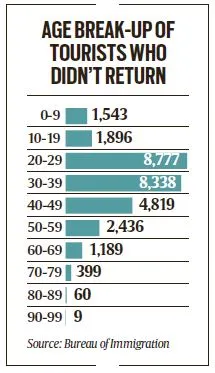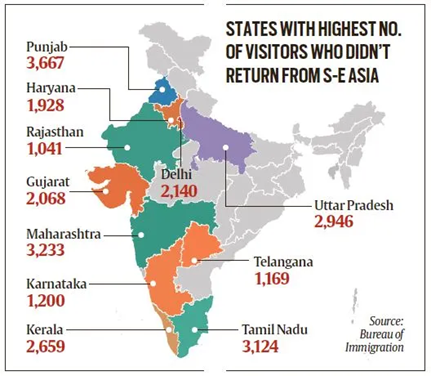- Courses
- GS Full Course 1 Year
- GS Full Course 2 Year
- GS Full Course 3 Year
- GS Full Course Till Selection
- MEP (Mains Enrichment Programme) Data, Facts
- Essay Target – 150+ Marks
- Online Program
- GS Recorded Course
- NCERT- First Ladder
- Polity
- Geography
- Economy
- Ancient, Medieval and Art & Culture AMAC
- Modern India, Post Independence & World History
- Environment
- Governance
- Science & Technology
- International Relations and Internal Security
- Disaster Management
- Ethics
- Current Affairs
- Indian Society and Social Issue
- CSAT
- 5 LAYERED ARJUNA Mentorship
- Public Administration Optional
- ABOUT US
- OUR TOPPERS
- TEST SERIES
- FREE STUDY MATERIAL
- VIDEOS
- CONTACT US
Cyber Slavery and Indian Nationals in Southeast Asia
Cyber Slavery and Indian Nationals in Southeast Asia

Recent reports indicate that around 29,466 out of 73,138 Indians who traveled to Southeast Asian countries (Cambodia, Thailand, Myanmar, and Vietnam) on visitor visas between January 2022 and May 2024 have not returned.
- This situation has raised concerns regarding "cyber slavery," where individuals are allegedly trapped and forced into cyber fraud.
Key Statistics
- Total Indians Traveled: 73,138
- Currently Unreturned: 29,466
- Age Distribution of Unreturned:

- Gender Breakdown: 21,182 males
- State-wise Distribution of Unreturned:

- Top Destinations of Unreturned Nationals:
- Thailand: 20,450 (over 69%)
- Vietnam: 6,242
- Cambodia: 2,271
- Myanmar: 503
Background : Reports of Cyber Slavery
EAM Jaishankar Addresses Cyber TraffickingExternal Affairs Minister S. Jaishankar has emphasized the Indian government's serious approach to addressing cyber trafficking issues involving nationals in Southeast Asia. In a recent address to the Lok Sabha, he provided updates on repatriation efforts and the government's strategies to combat this growing problem. Key Statistics on Repatriation
Government Actions and Responses
Recent Developments in CambodiaThe Indian Embassy in Cambodia is actively working to facilitate the return of Indian nationals who have been scammed into working as "cyber slaves." Key points include:
|
Cyber Crime Trends
Data from the Indian Cyber Crime Coordination Centre (I4C) reveals:
- A significant rise in cyber-crimes, with about 45% originating from Southeast Asia.
- Approximately 1 lakh cyber complaints have been recorded with the National Cyber Crime Reporting Portal since January 2023.
Challenges Identified
The inter-ministerial panel has highlighted several gaps that need addressing:
- Banking and Financial Oversight: Loopholes in banking regulations allow fraudulent transactions to occur without detection.
- Immigration Controls: Lack of effective monitoring of individuals traveling on visitor visas.
- Telecom Sector Monitoring: Insufficient mechanisms to track and regulate communication services used by scammers.
Preventive Measures
To combat this issue, the following steps have been suggested:
- Identification Mechanisms: Develop systems to identify potential victims before they leave India.
- Aviation Measures: The Ministry of Civil Aviation has been directed to implement protocols that minimize the risk of potential victims traveling abroad.
Conclusion
The situation of Indian nationals reportedly trapped in "cyber slavery" in Southeast Asia underscores the urgent need for comprehensive strategies to safeguard potential victims. Strengthening regulatory frameworks in banking, immigration, and telecommunications is essential to prevent such exploitation. The government's proactive response and ongoing monitoring will be crucial in addressing this alarming trend and ensuring the safety of Indian citizens abroad.
Must Check: Best IAS Coaching In Delhi
UPSC Prelims Result 2024 Out: Expected Cut Off & Other Details, UPSC Prelims 2024 Answer with Explanation, Daily Prelims Quiz, Daily Current Affairs, MONTHLY CURRENT AFFAIRS TOTAL (CAT) MAGAZINE, Best IAS Coaching Institute in Karol Bagh, Best IAS Coaching Institute in Delhi, Daily Mains Question Answer Practice, ENSURE IAS UPSC Toppers, UPSC Toppers Marksheet, Previous Year Interview Questions, UPSC Syllabus




